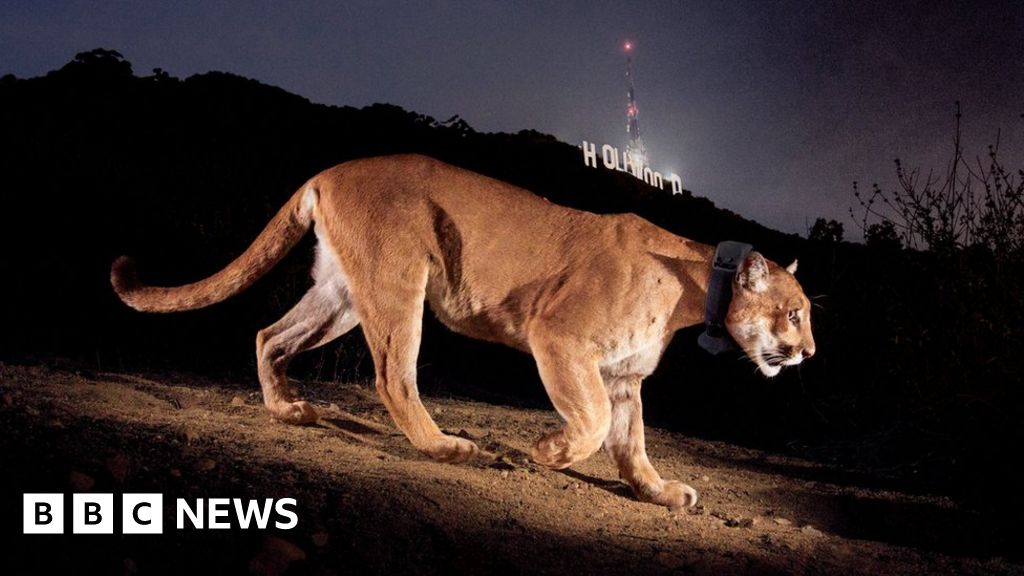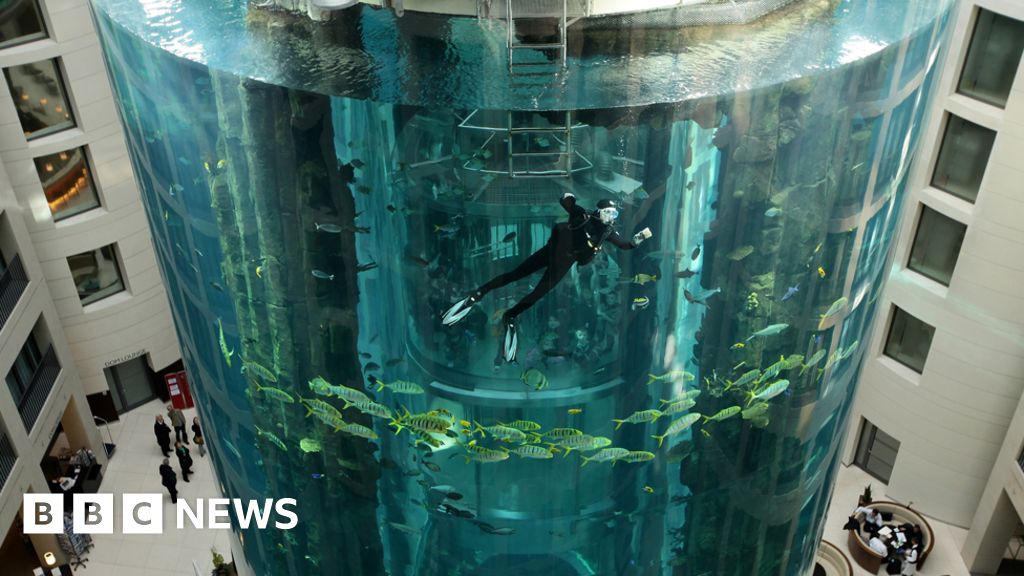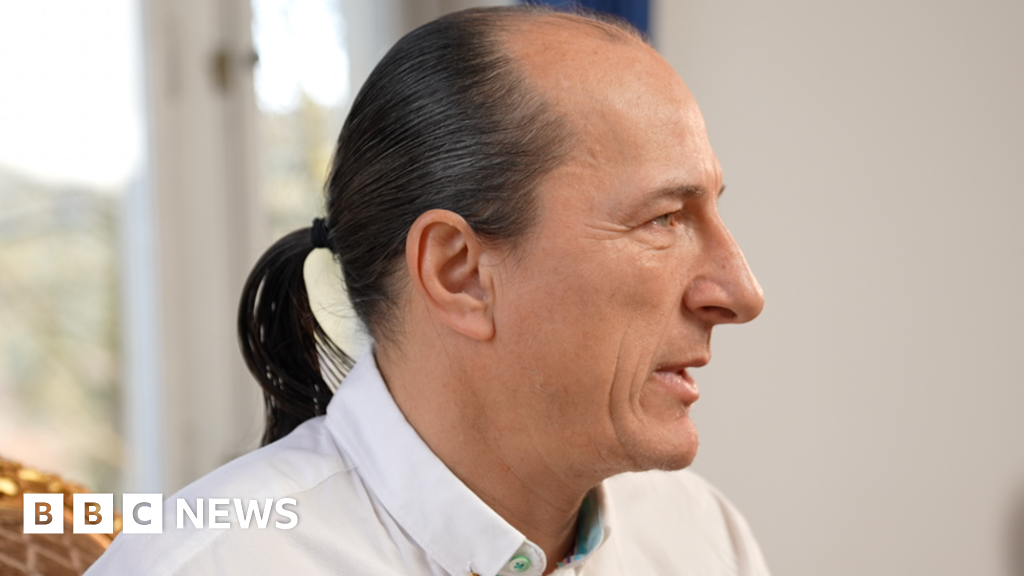
Announcement
Collapse
No announcement yet.
In Other News
Collapse
X
-
P-22, Hollywood's celebrity mountain lion, ends his reign
It was late at night in Los Angeles, and artist Corie Mattie had indulged in a glass or two of wine when she heard something outside her home.
At first she thought her brother's Labrador retriever had got out, so she went to let him in.
It was not a chocolate lab.
"It was a [expletive] mountain lion," Ms Mattie said.
And not just any mountain lion - but the most famous mountain lion in Hollywood, and arguably the world.
His name is P-22 and the March encounter left an indelible mark, Ms Mattie said.
His green eyes glowed straight at her. She stared back. She took a quick video before hiding inside, and P-22 lingered until dawn, when he quietly made his exit over a lattice fence.
"He touched my soul. He could have destroyed me, and he didn't," she said. "It escalated quickly to my spirit animal. It went from zero to one hundred, really quick."
Ms Mattie was not the first Angeleno P-22 had bewitched, but residents can no longer look forward to magical encounters with the mysterious beast.
On Saturday, the hearts of P-22's fans were shattered when the California Department of Fish and Wildlife announced that, due to his old age and a host of serious heath issues, the legendary feline was humanely put to sleep. Officials called it "the most difficult, but compassionate choice."
He has had the city in his thrall since 2012, when he somehow managed to get across two deadly freeways and take up residence in Griffith Park, a 4,200-acre mountain in the heart of one of the world's biggest concrete jungles.
Since then, his charisma and curious choice of city habitat have made him a local folk hero. His plight - trapped in an urban island with no possibility of finding a mate - also made him the face of a movement to protect the threatened species.
Though he will no longer prowl through the heart of Los Angeles, his decade-long reign has cemented his status as a Hollywood star as bright as any on the big screen.
A star is born
Griffith Park is minuscule compared to a mountain lion's typical average range of 150 sq miles. Yet like many city-dwellers, P-22 was willing to sacrifice space for a prime location.
He was first discovered in February 2012, when Miguel Ordeñana, a biologist who had set up camera traps in the park, was checking overnight footage.
"All of a sudden this massive puma butt comes across my computer screen!" Mr Ordeñana recalled.
At first he could not believe it, but a subsequent photo confirmed that the park had an exciting new resident.
By August, P-22 got his first profile in the LA Times.
The big cat captured the imagination of famed nature photographer Steve Winter, who set up a camera trap beneath the Hollywood sign. He waited over a year before P-22 sauntered into the frame.
The photo got a spread in National Geographic, and a star was born.
"It gave people hope, because they're living in this big urban area, and they have this park they walk into that was actually wild with a California cougar," Mr Winter said. "He became a celebrity in the city of celebrities."
A decade of P-22 escapades ensued. He gave a repairman a fright in 2015 when he hid in a crawl space below a Los Feliz home. He was occasionally spotted on doorbell and park cameras, looking regal, even cute, as he feasted on a deer he'd just slaughtered. The city loved him so much that they forgave him when he (probably) killed a koala at the LA Zoo. Los Angeles has declared 22 October "P-22 Day".
But he also came to symbolise a much darker reality for California's mountain lions.
Local prey - coyotes, raccoons, and other small animals - are laced with the rat poison that has become ubiquitous around Los Angeles.
In 2014, camera traps spotted P-22 looking ill and officials hauled him in for treatment. A mugshot of P-22 looking grizzled and bemused quickly went viral, but the cause was no joke. He was found to be full of rat poison and consumed by mange - conditions that kill most mountain lions.
The specie's habitats have been choked off by California's freeways. Though as many as 6,000 mountain lions live in California, researchers believe the population in the Santa Monica Mountains, where P-22 was probably born, could die out in 50 years as the cats have resorted to inbreeding, weakening their genetic pool.
The great slashes of asphalt also make journeys to new homes potentially deadly. In September, a pregnant mountain lion was struck and killed when she tried to cross a Malibu highway, which bisects a key swathe of habitat. She and her four unborn cubs all had traces of rat poison in their systems.
Once, Mr Ordeñana captured a video of P-22 making plaintive mating calls. They would never be answered; the freeways and development surrounding Griffith Park guaranteed he was walled off from any potential females and would never reproduce.
The lion king's reign has ended
His presence among the humans who loved him brought about his downfall. At the advanced age of 12, he started spending more time acting erratically in the urban areas around the park. Recently, he killed a chihuahua, one of Los Angeles' less endangered but highly protected species. The final straw came after he attacked a resident walking their dog.
When officials cornered him in a backyard on 12 December, P-22 was underweight, full of mange and suffering from an eye injury that likely came from a vehicle collision, said the National Park Services' Jeff Sikich, a biologist who spent more time with P-22 than any other. It was revealed at a press conference the next day that he was unlikely to be released back into the wild.
On 17 December, wildlife officials announced that after a thorough health evaluation revealed kidney disease, a heart condition, and other serious ailments, veterinarians had recommended a humane euthanasia.
"I told him I was so sorry that we did not make the world a safer place for him," said Beth Pratt of the National Wildlife Federation, who was present for P-22's final moments.
As tragic as his end has been, his loyal fans say that his legacy as an LA icon is secure.
"He survived out here against all odds," said Ms Mattie, who was inspired to paint a large mural of P-22 and get involved in conservation campaigns. "A lot of people can relate to him. It's not easy, LA will chew you up and spit you out," she said - but he endured.
Leave a comment:
-
Well, it's all water under the bridge now... and on the street... and in the lobby...
-
Doesn't Greece have one of those 'tiger economies'? Maybe she had too much money for the banks to handle? Where is our Greek to illuminate us?
-
Belgian police raided her (and other) offices/whatever and thought she is corrupt just because they found bags full of cash or so. IMO that's jumping to conclusions. Might just have been emergency cash in case of a raid
Leave a comment:
-
I wonder what happened to the Principality of Sealand?
It is basically a sandbank in the North Sea where the U.K. built an anti-aircraft platform in WW2 then later abandoned after the war. An excentric British fishing boat captain later tried to use an absurd interpretation of international law to claim it was abandoned territory and declared it an independent country and himself the prince of "Sealand" as he called the abandoned AA platform.Last edited by Dinner; December 13, 2022, 01:22.
Leave a comment:
-
There's several - but go ahead and start a new one...Originally posted by Berzerker View Post
I thought this was the other news thread, where is the serious news thread?
Leave a comment:
-
I was issuing papers to my own country when I was a kidOriginally posted by Broken_Erika View PostThe self-proclaimed kingdom that doesn't recognise Germany
(...)

We were an exclusive bunch, staying in the low single-digit number of inhabitants
We always lacked intl recognition tho
Leave a comment:
-
The self-proclaimed kingdom that doesn't recognise Germany
In the depths of the countryside in eastern Germany, there's an invisible border.
The turrets of an imposing castle loom out of the treetops. A sign on its front door solemnly informs the visitor that they've entered - in effect - a new country.
The "Königreich Deutschland" (Kingdom of Germany) is a self-proclaimed independent state - complete with its own self-appointed king.
Peter the First, as he prefers to be known, receives us in a rather gloomy wood-panelled hall.
It's about a decade since his coronation - there was a ceremony, complete with orb and sceptre - and the foundation of his so-called kingdom, which mints its own money, prints its own ID cards and has its own flag.
He's what's known in Germany as a "Reichsbürger" (Citizen of the Reich), one of an estimated 21,000 people who are defined by the country's intelligence agencies as conspiracy theorists who don't recognise the legitimacy of the post-war German state.
They've risen to prominence this week, with the arrest of 25 people in raids on Reichsbürger suspected of plotting to storm the German parliament building, the Reichstag, in a violent overthrow of the government.
King Peter says he has no such violent intentions.
But he does believe the German state to be "destructive and sick".
"I have no interest in being part of this fascist and satanic system," he says.
We settle in another room to talk, on plush armchairs under a glittering chandelier.
But this is no salon; we're surrounded by lights and cameras. This is King Peter's own TV studio - he hopes to start a TV channel - and I learn that one of his subjects will be recording every moment of our interaction.
He felt, he said, that he had no choice but to found his kingdom, having tried, unsuccessfully, to run as a mayor and a member of the German parliament.
"People who are corrupt, criminal or willing to be used thrive in the German system and those with an honest heart, who want to change the world for the better, in the interests of the common good, don't have a chance."
His real name is Peter Fitzek, and his activities have brought him into frequent conflict with the German law.
Germany doesn't recognise the kingdom or its documents: Mr Fitzek has several convictions for driving without a licence and running his own health insurance programme. He also went to prison for several years for embezzling his citizens' money but the conviction was later quashed.
The regional intelligence service, which has been watching him and his kingdom for nearly two years, told us they regarded it as a threat. They liken it to a cult which exposes people to conspiracy theories and extremist ideology.
Such theories and ideology have proliferated in Germany in recent years, fuelled by the pandemic. And Covid-19 appears to have increased support and membership of the kingdom.
Mr Fitzek tells us he has about 5,000 citizens. He's expanding the kingdom, buying up land in Germany in order to set up a number of communities in which those people can ultimately live.
We visited one such outpost about 150 miles (240km) away from the king's castle.
Ancient trees surround the site of another old castle in the village of Bärwalde, an hour and a half's drive south of Berlin. Around 30 people live on the site either in the main building or caravans which scatter the lawn along the main driveway.
Despite the faded beauty of the castle, it's a bleak place. They're still renovating the buildings and clearing the grounds. Tree trunks still grow through the skeleton of an old greenhouse.
But the people here are proud of their home which they also consider it to be kingdom territory.
Citizens don't pay German tax and won't send their children to school, which is illegal in Germany. They are bound by their own legal structure - presided over, I'm told, by King Peter - and ultimately they intend to have their own healthcare system.
"The kingdom can provide everything that you need in daily life. Food and nourishment, social security, all these systems are there," says Benjamin, who recently moved in with his young family and is responsible for PR.
For all their plans to build a sustainable green community, using modern technologies, citizens appear to have little faith in modern medicine.
No-one here is vaccinated against Covid-19, Benjamin told me. It's a common position for Reichsbürger, many of whom joined protests against measures to control the pandemic.
"People who think for themselves today will often be condemned as conspiracy theorists," says Benjamin. "But it's a fact that these are often the people who stay up at night thinking about problems, not just their own but those of society and politics."
As we left the commune and drove back through the village, a neighbour was standing on his front lawn.
When I asked what he thought of his neighbours, he frowned. They should pay tax he said. After all, they still accessed Germany's resources. But what worried him the most, he added, were his own children. "What kind of influence will this lot have on them?"
For many years Reichsbürger were a bit of a national joke. Germany is learning to take them seriously.
Leave a comment:




Leave a comment: